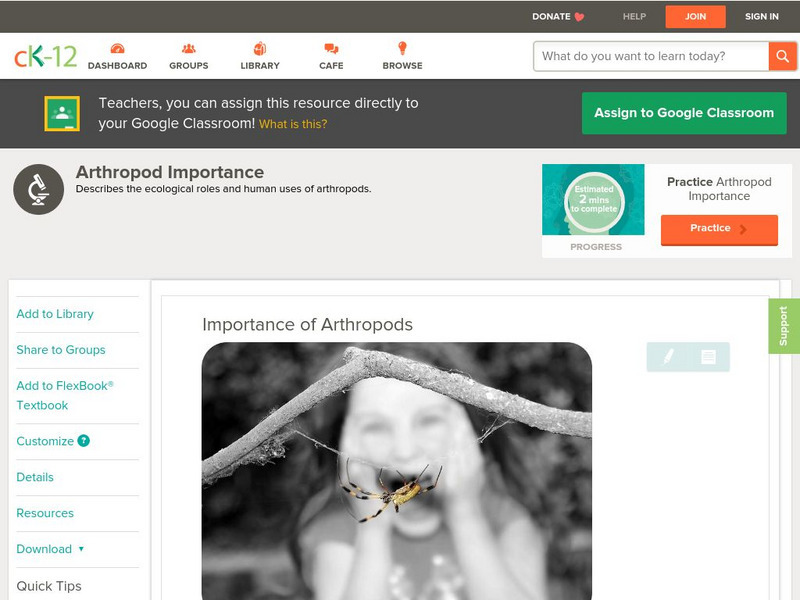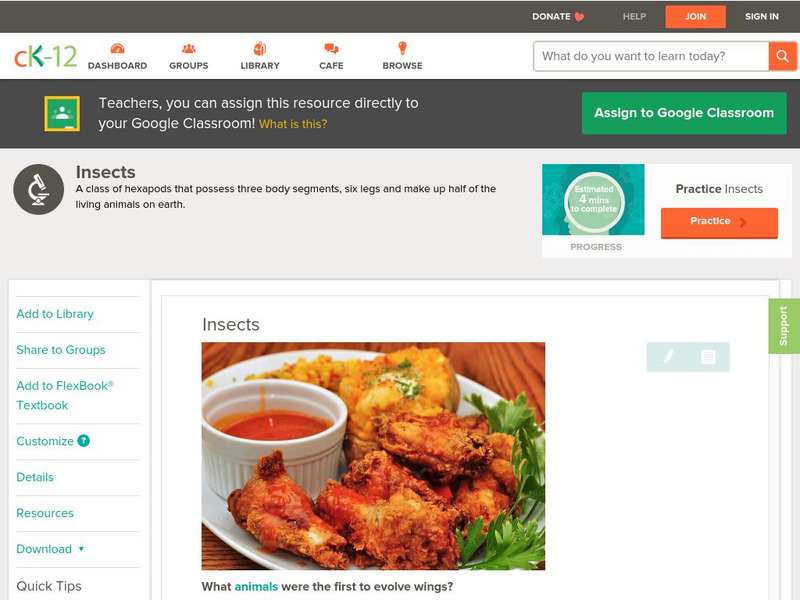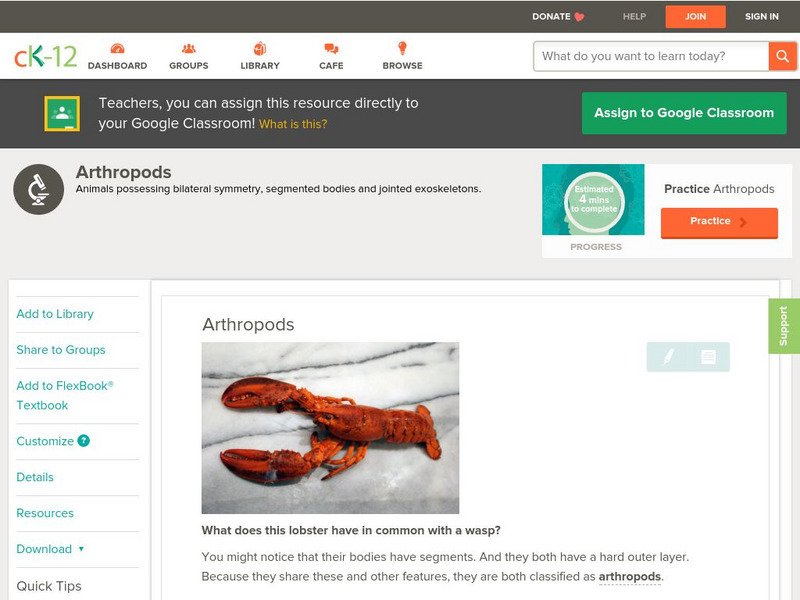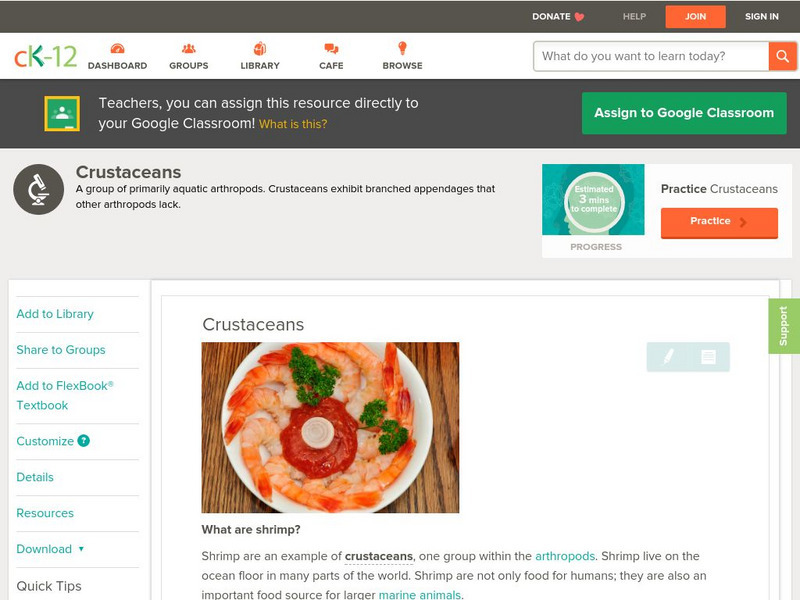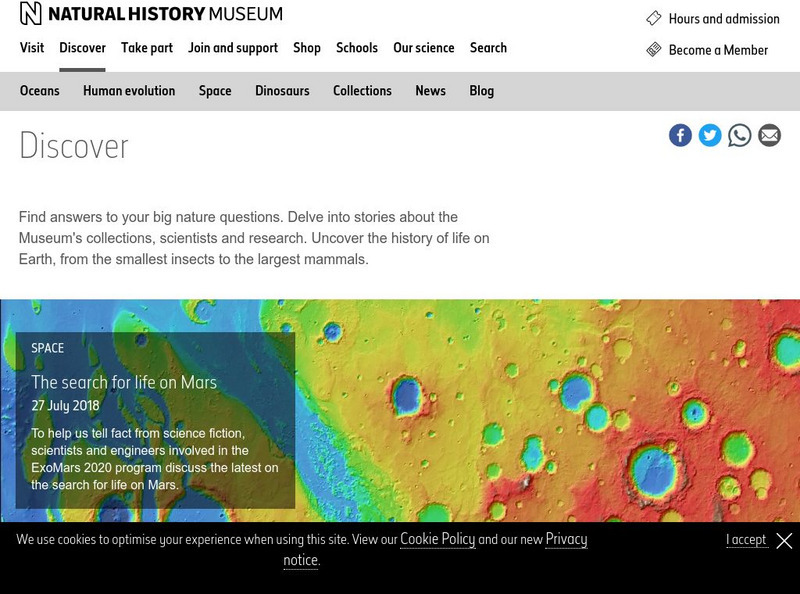American Museum of Natural History
American Museum of Natural History: Pseudoscorpions O Logy Card
Flip this interactive OLogy card to find fast facts, questions and answers, and other bite-size pieces of information about pseudoscorpions.
Other
Backyard Nature: Arthropods in General
A general overview of the physical characteristics of arthropods, including information about their important ecological role on the planet with their immense population.
CK-12 Foundation
Ck 12: Life Science: Importance of Arthropods
[Free Registration/Login may be required to access all resource tools.] Arthropods might seem a little scary, but they are actually performing important roles in the environment. Arthropods are important to the ecosystem and to humans in...
CK-12 Foundation
Ck 12: Life Science: Insects
[Free Registration/Login may be required to access all resource tools.] Insects, with over a million described species, are the most diverse group of animals on Earth. They may be found in nearly all environments on the planet. No matter...
CK-12 Foundation
Ck 12: Life Science: Arthropods
[Free Registration/Login may be required to access all resource tools.] How often do you think you see an arthropod? With over a million described species in the phylum containing arthropods, chances are you encounter one of these...
CK-12 Foundation
Ck 12: Life Science: Crustaceans
[Free Registration/Login may be required to access all resource tools.] Crustaceans are a large group of arthropods, consisting of almost 52,000 species. The majority of crustaceans are aquatic. A few groups have adapted to living on...
University of Florida
University of Florida: Featured Creatures: The House Fly
Anything and everything you've ever wanted and needed to know about the common house fly, otherwise known as Musca domestica.
Natural History Museum
Natural History Museum: Insects and Spiders
As an online exhibit from the Natural History Museum, this site examines many different subtopics stemming from a study on both insects and spiders. Several of the subtopics include spider bites, bumblebees, moths, edible insects,...
University of Michigan
Critter Catalog: Myriapods
This informative site provides a description of the characteristics of Myriapods. Local animals (southeastern Michigan) in these groups are then examined in further detail. Pictures and classification groupings are included in this site.
BiologyWise
Biology Wise: Chitin: Structure, Function, and Uses
Chitin is a biopolymer that gives rigidity to exoskeletons and other protective structures of organisms, thereby preventing injury to soft internal tissues and other parts. Its chemical structure is shown and its functions are described.
Georgia Aquarium
Georgia Aquarium: Japanese Spider Crab
Use this animal guide to learn the scientific name and discover the habitat, diet, reproduction, physical and unique characteristics of the Japanese spider crab.
CK-12 Foundation
Ck 12: Life Science: 9.14 Importance of Arthropods
Understand the behaviors, characteristics, and classification of arthropods.
CK-12 Foundation
Ck 12: Life Science: 9.10 Arthropods
Explore the behaviors, characteristics, and diversity of arthropods.
San Diego Zoo Global
San Diego Zoo: Kids: Tarantula
Colorful resource for learning fun facts about tarantulas with photographs as well as information regarding their physical characteristics and unique features.
San Diego Zoo Global
San Diego Zoo: Kids: Spider
Colorful resource for learning useful facts about spiders with photographs as well as information regarding their physical characteristics and unique features.
Monterey Bay Aquarium
Monterey Bay Aquarium: Acorn Barnacle
Meet the acorn barnacle and learn cool facts, its natural history, and conservation status.
Saint Louis Zoo
Saint Louis Zoo: Monarch Butterfly
Learn animal facts about the appearance, behavior, life cycle, and diet of the monarch butterfly.
Other
San Francisco Zoo: Land Hermit Crab
Detailed information and fascinating facts about the land hermit crab include diet, habitat, physical features, behavior, and conservation status.
Other
San Francisco Zoo: Darkling Beetle
Detailed information and fascinating facts about the Darkling beetle include diet, habitat, physical features, behavior, and conservation status.
Other
San Francisco Zoo: Black Widow Spider
Detailed information and fascinating facts about the black widow spider include diet, habitat, physical features, behavior, and conservation status.
Other
San Francisco Zoo: Honey Bees
Detailed information and fascinating facts about the honey bee include diet, habitat, physical features, behavior, and conservation status.
University of California
Ucmp: Introduction to Trilobita
One of the most famous fossil organisms, trilobites were once a complex group. Learn to tell them apart in this illustrated article that tells how they lived, their body structure, there place in evolution, and the like.
Yale University
Yale New Haven Teachers Institute: Animal Kingdom
Background information about all of the classes of the animal kingdom, followed by four short lesson plan outlines.
PBS
Pbs: Scientific American Frontiers: Shell Game
A companion to a PBS program, this Jeopardy-style game test students as they identify the characteristics of mollusks.




